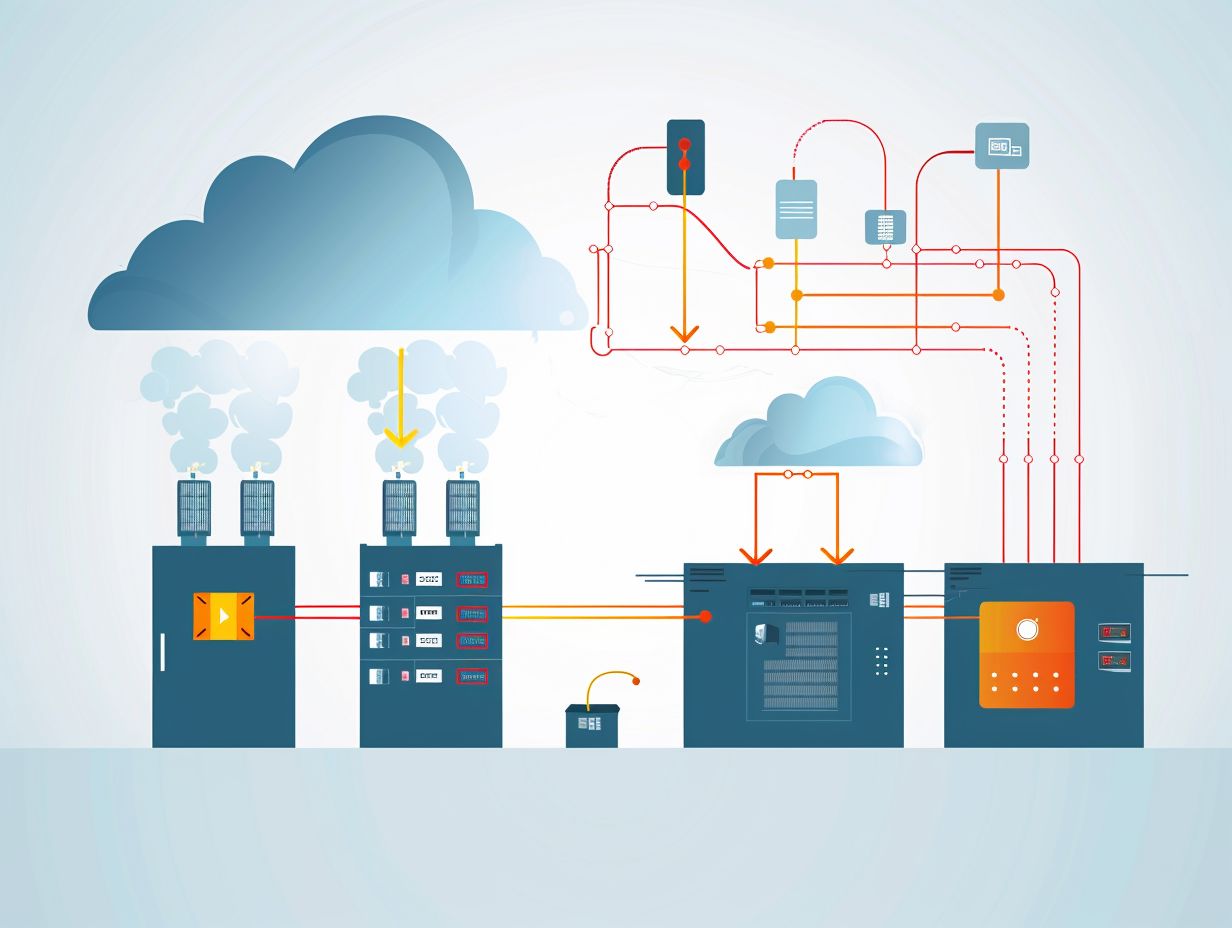Comparing Onpremises And Cloudbased Firewall Solutions

If you are seeking to improve your network security by implementing a firewall solution, you may be deliberating between on-premises and cloud-based options. This article will analyze the features, advantages, costs, and factors to consider for both types of firewall solutions.
A comparison of the main distinctions and similarities between on-premises and cloud-based options will be provided to aid in your decision-making process. Gain insights into the key factors to contemplate when determining the most suitable firewall solution for your business requirements and resources.
Key Takeaways:

What is a Firewall?
A firewall is a network security system that monitors and controls incoming and outgoing network traffic based on predetermined security rules. It acts as a barrier between a trusted network and an untrusted network, such as the internet, to protect against unauthorized access and cyber threats.
Firewalls can be categorized into two types: hardware firewalls and software firewalls. Hardware firewalls are physical devices that are placed at the network gateway, filtering traffic before it reaches the network. Software firewalls, on the other hand, are programs installed on individual devices, providing protection at the device level.
Commonly used protocols in firewall systems include TCP (Transmission Control Protocol), UDP (User Datagram Protocol), and ICMP (Internet Control Message Protocol), which help in regulating data flow and ensuring secure communication.
On-Premises Firewall Solutions
On-premises firewall solutions encompass firewall systems physically situated within an organization’s premises, typically positioned between the internal network and the internet connection. This deployment involves utilizing dedicated hardware or software-based firewall systems.
Features and Benefits
When implementing on-premises firewall solutions, you benefit from features such as packet filtering, application-layer filtering, VPN support, and intrusion detection capabilities. These solutions provide enhanced network security, real-time traffic monitoring, threat prevention, and the ability to create customized rule sets.
On-premises firewall solutions are crucial for protecting sensitive data and critical resources within your organization’s network infrastructure. By examining incoming and outgoing traffic, the firewall can block malicious packets, reducing the likelihood of cyberattacks and unauthorized access. The capability to establish custom rules enables organizations to tailor security measures to their specific requirements, facilitating a more proactive approach to threat mitigation. This meticulous regulation of network traffic not only enhances data protection but also contributes to improved network performance by optimizing traffic management and reducing bandwidth congestion.
Costs and Considerations

When considering on-premises firewall solutions, businesses must take into account the various factors that contribute to the overall cost. These factors include the type of hardware or software chosen, maintenance requirements, licensing fees, and available support services. It is important to assess scalability, compatibility with existing infrastructure, vendor reputation, and the level of support provided by the vendor.
Businesses should also consider the initial setup costs, which encompass expenses such as hardware purchases, software licenses, and professional installation fees. Additionally, ongoing maintenance costs, including updates, patches, and security subscriptions, need to be factored in when determining the total cost of ownership.
An evaluation of service offerings is necessary to ensure that features like intrusion detection, VPN support, and reporting capabilities meet the organization’s specific security requirements. Furthermore, long-term support options are essential to guarantee that the firewall solution remains effective and secure in the long run.
Cloud-Based Firewall Solutions
Cloud-based firewall solutions are virtual firewall systems that are deployed and managed in the cloud by third-party security providers. These solutions provide scalable, subscription-based security services that protect cloud-based applications and data.
Features and Benefits
Cloud-based firewall solutions offer you features such as centralized management, automatic updates, API integration, and threat intelligence feeds. The benefits you can expect include enhanced flexibility, reduced hardware costs, seamless scalability, and improved visibility into your cloud-based traffic.
These solutions are meticulously designed with cloud-native capabilities, allowing them to seamlessly adapt and scale with your dynamic cloud environments. By leveraging automation features, your organization can ensure quick deployment, configuration changes, and real-time threat response, ultimately enhancing your overall security posture.
The integration with cloud services not only enhances service delivery efficiency but also optimizes resource utilization, providing a more holistic approach to cloud security management. This results in improved agility, centralized control, and cost-effectiveness for businesses like yours that utilize cloud-based firewall solutions.
Costs and Considerations
The costs of cloud-based firewall solutions depend on your subscription model, data usage, add-on services, and compliance requirements. When considering these solutions, you need to take into account factors such as data sovereignty, regulatory compliance, technology compatibility, scalability, and the establishment of defined security rules.
For many organizations seeking flexibility in managing costs, pay-as-you-go pricing is a popular option. Different service tiers offer varying levels of features and support, enabling companies to choose the most appropriate option based on their specific requirements. However, it’s essential to note that additional features like advanced threat protection or VPN connectivity may come with additional charges.
When evaluating cloud firewall services, it is critical for your business to align the technology features with your existing infrastructure to ensure seamless integration. Customization of security rules is key to addressing your specific organizational needs and ensuring robust protection. Moreover, your compliance needs, such as adherence to industry regulations or data privacy laws, should be the guiding principles in the selection process to maintain legal standards.
Comparison of On-Premises and Cloud-Based Firewall Solutions

When comparing on-premises and cloud-based firewall solutions, you should evaluate factors such as:
- Deployment flexibility
- Maintenance overhead
- Scalability
- Data privacy
- Integration complexity
Each solution offers distinct advantages and challenges based on your organization’s requirements and existing infrastructure.
Key Differences and Similarities
The key differences between on-premises and cloud-based firewall solutions lie in deployment models, infrastructure ownership, maintenance responsibilities, and data accessibility. Both solutions aim to protect networks, data, and applications from security threats and unauthorized access.
On-premises firewalls are physically located within the organization’s premises, providing direct control over hardware and security policies. This setup offers a higher level of customization and allows organizations to tailor security measures according to specific needs.
In contrast, cloud-based firewalls are hosted and managed off-site by a third-party service provider. This off-site management means that organizations can benefit from scalable resources, automatic updates, and continuous monitoring without the burden of hardware maintenance.
Ultimately, the choice between on-premises and cloud-based firewalls depends on factors such as budget, internal expertise, and the need for flexibility in adapting to evolving security threats.
Factors to Consider When Choosing a Firewall Solution
When selecting a firewall solution, you must carefully consider various factors, including:
- Security requirements
- Budget constraints
- Scalability needs
- Technology compatibility
- Regulatory compliance
- Resource availability
It is crucial to ensure that the chosen firewall solution is aligned with your organization’s specific security objectives and operational capabilities.
Business Needs and Resources
When selecting the right firewall solution, you need to conduct a thorough assessment of your organization’s business needs, current resources, threat landscape, and data protection requirements. It is essential to carry out a risk analysis, evaluate possible vulnerabilities, and align the capabilities of the firewall with your overarching security strategy.
This alignment is critical to ensure that the firewall solution effectively protects your critical assets and sensitive information from evolving cyber threats. Customized security frameworks are key in tailoring defenses to your specific business operations and compliance requirements. By incorporating threat intelligence feeds into your firewall system, you can enhance your ability to promptly detect and respond to malicious activities. Continuously monitoring network traffic and security events allows for proactive identification of anomalies, enabling timely action against potential security breaches.
Frequently Asked Questions

What is the difference between on-premises and cloud-based firewall solutions?
On-premises firewall solutions are hardware devices that are physically installed on the organization’s premises, while cloud-based firewall solutions are virtual firewalls hosted on a cloud platform.
Which is more cost-effective, on-premises or cloud-based firewall solutions?
It depends on the organization’s specific needs and resources. On-premises firewall solutions may require a larger upfront cost for hardware and maintenance, while cloud-based solutions have a subscription-based pricing model.
Can both on-premises and cloud-based firewall solutions provide the same level of security?
Yes, both types of firewalls can offer the same level of security, as long as they have the necessary features and configurations in place.
What are the primary benefits of using on-premises firewall solutions?
On-premises firewalls offer greater control and customization options, as well as the ability to keep all sensitive data within the organization’s premises.
What are the primary benefits of using cloud-based firewall solutions?
Cloud-based firewalls offer scalability, flexibility, and the ability to access the firewall from any location with an internet connection.
Can an organization use both on-premises and cloud-based firewall solutions together?
Yes, some organizations may choose to have a hybrid solution that combines both on-premises and cloud-based firewalls to maximize security and efficiency.









